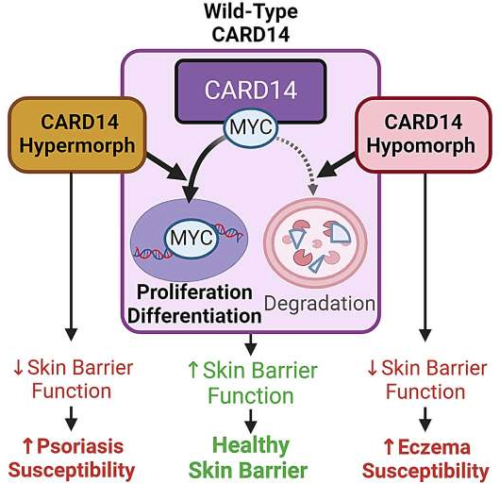by Ernie Mundell Ultraprocessed foods have been linked to a myriad of health issues, and a new study suggests that the autoimmune skin disease psoriasis might be added to that list. “Results of this study showed an association between high ultraprocessed food intake and active psoriasis status,” concluded a team led by Dr. Emilie Sbidian,...
Tag: <span>Psoriasis</span>
Increased psoriasis risk found in cancer patients treated with immune checkpoint inhibitors
by Justin Jackson , Medical Xpress Credit: Estzer Miller on Pixabay Researchers from the National Defense Medical Center in Taiwan have identified an increased risk of psoriasis in patients with cancer undergoing immune checkpoint inhibitor (ICI) treatments, with implications for other immune-related adverse events. Over the past decade, ICIs have become an increasingly important part...
Psoriasis patients can get clearer skin with at-home treatment instead of at doctors’ offices, study suggests
by Alex Gardner, Perelman School of Medicine at the University of Pennsylvania Credit: Estzer Miller on Pixabay For decades, people with psoriasis have been treated in clinics with narrowband ultraviolet B phototherapy, or light therapy, to reduce sores, scales, and inflammation. Now, new research from the Perelman School of Medicine at the University of Pennsylvania shows...
How Do Tapinarof and Roflumilast Creams Fit Into Psoriasis Treatment?
HUNTINGTON BEACH, Calif. — The US Food and Drug Administration (FDA) approvals of tapinarof 1% cream and roflumilast 0.3% cream as treatment options for patients with plaque psoriasis came more than 1 year after the American Academy of Dermatology/National Psoriasis Foundation Guidelines of care for the management and treatment of psoriasis with topical therapy and alternative medicine...
Comorbidities Associated With Psoriasis: 5 Things to Know
Psoriasis is an immune-mediated chronic inflammatory skin disease that affects approximately 2%-4% of adults in Western countries. Over the past decade, discovery of the pathogenic pathways in psoriasis has led to a greater understanding of the role psoriasis plays in systemic inflammation and associated comorbidities. Several recent studies have shown that patients with psoriasis have higher rates of comorbid...
Are Genes Responsible for Causing Psoriasis?
Psoriasis is a chronic inflammatory skin condition that affects 0.11%-1.58% of people globally. There are multiple types of psoriasis, of which plaque psoriasis is the most common, affecting up to 80% of individuals with psoriasis. Other types of psoriasis include guttate, pustular, flexural, erythrodermic, and follicular. Psoriasis can significantly impair a person’s quality of life and lead to serious comorbidities such as psoriatic arthritis, hypertension, cardiovascular diseases, and...
Home-Based Phototherapy for Psoriasis as Effective as Office-Based Treatment
TOPLINE: Home-based phototherapy for plaque and guttate psoriasis is as effective as office-based phototherapy, according to results of the randomized Light Treatment Effectiveness study. METHODOLOGY: TAKEAWAY: IN PRACTICE: “These data support the use of home phototherapy as a first-line treatment option for psoriasis,” and “efforts are needed to make home and office phototherapy more available to patients,”...
A cure for psoriasis: Could a faulty iron hormone in the skin be the key?
News Release 26-Sep-2024 Scientists believe the hormone hepcidin, when produced in the skin, may be the root cause of psoriasis – a chronic and sometimes debilitating skin disease that affects 2-3% of the global population. Peer-Reviewed PublicationUniversity of Bath Scientists may have uncovered the root cause of psoriasis, a chronic and sometimes debilitating skin disease...
New findings on CARD14 protein’s role in eczema and psoriasis
August 8, 2024 by Cincinnati Children’s Hospital Medical Center Study pierces a mystery of healthy skin barrier formationCARD14 directly binds and regulates MYC, a protein involved in controlling cell growth that can contribute to cancer when it malfunctions. A study published in Cell Reports shows that the proper interaction between these two proteins is important...
Psoriasis Linked to Higher Incidence of MACE Despite Statin Use
Over a period of 5 years, the likelihood of major adverse cardiovascular events (MACE) in patients with psoriasis and dyslipidemia who were on statin therapy was 40% greater than that in non-psoriasis patients with dyslipidemia on statin therapy, even after adjusting for covariates, results from a large retrospective study showed. “It is well-established that psoriasis...

